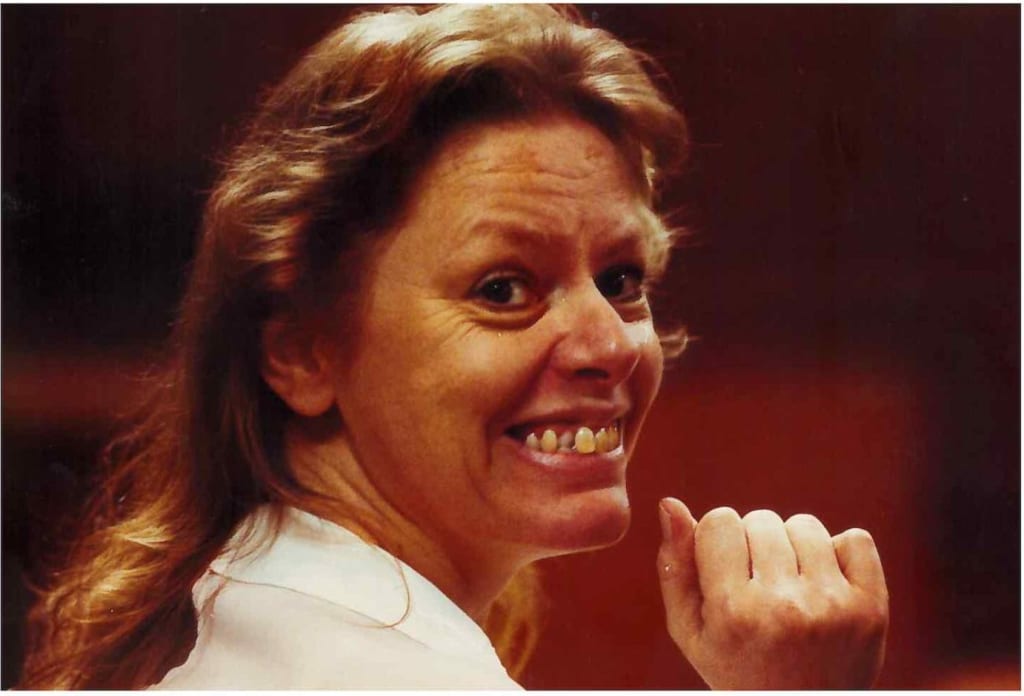The Tragic Tale of a Serial Killer
The lady killer

Aileen Wuornos is a name that strikes fear into the hearts of many. She was a notorious serial killer who terrorized the state of Florida in the late 1980s and early 1990s. Her story is one of tragedy and despair, a cautionary tale about the dangers of a life gone wrong.
The story of Aileen Wuornos begins in the early 1960s, in Rochester, Michigan. She was born into a troubled family, with an alcoholic father and a mother who abandoned her and her brother when they were young. Wuornos was forced to fend for herself from an early age, and she turned to prostitution as a means of survival.
As a young woman, Wuornos lived a life of constant struggle. She moved from place to place, taking whatever work she could find and relying on the kindness of strangers to get by. But her life took a dark turn when she met Tyria Moore, a woman who would become her lover and accomplice in a string of murders that would shock the nation.
Wuornos and Moore began their killing spree in 1989, targeting men who picked them up on the side of the road. Wuornos would lure the men into a secluded area, where she would shoot them and rob them of their belongings. Over the course of a year, the two women killed seven men, leaving a trail of death and destruction in their wake.
The killings eventually caught up with Wuornos and Moore, and they were arrested in 1991. Wuornos was put on trial for murder, and she was eventually convicted and sentenced to death. Her story became the subject of numerous books, movies, and television shows, cementing her place in history as one of the most notorious serial killers of all time.
The story of Aileen Wuornos is a tragic one, a tale of a woman who was failed by society at every turn. She was abandoned by her family, forced into a life of prostitution, and ultimately driven to murder by a combination of desperation and mental illness. But even in the face of such overwhelming adversity, Wuornos remained a complex and fascinating figure, a study in the dark corners of the human psyche.
In the end, Aileen Wuornos serves as a chilling reminder of the dangers of a life gone wrong. Her story is a cautionary tale about the importance of compassion and understanding, and a warning about the consequences of neglecting those who are most in need. But it is also a testament to the resilience of the human spirit, a testament to the power of the human will to survive and overcome even the most daunting of challenges.
Despite the horror and tragedy of her crimes, Wuornos' story also sheds light on the social and economic issues that often underlie violent crime. She was a victim of poverty, abuse, and neglect, and her life and crimes are a stark reminder of the systemic failures that contribute to the marginalization of vulnerable individuals.
Throughout her trial and incarceration, Wuornos was a controversial figure. Some saw her as a monster, a ruthless killer who deserved nothing less than the death penalty. Others saw her as a victim, a woman who had been failed by society and driven to murder by circumstances beyond her control.
But regardless of one's opinion of Wuornos, there is no denying the impact she had on the public consciousness. Her story has been the subject of countless articles, documentaries, and works of fiction, and her legacy continues to fascinate and horrify to this day.
In the end, Aileen Wuornos was a tragic figure, a victim of her own circumstances and the society that failed her. Her story is a powerful reminder of the importance of compassion and empathy, and a call to action for all of us to work towards a more just and equitable world.
As Wuornos' case gained national attention, it sparked a conversation about the nature of violence against women and the impact of poverty and abuse on marginalized individuals. Her story highlighted the need for greater support and resources for those in vulnerable situations, particularly those who have experienced trauma and abuse.
Despite the notoriety surrounding her case, Wuornos remained a complex and enigmatic figure. She was alternately portrayed as a cold-blooded killer and a victim of circumstance, a woman driven to the brink by forces beyond her control. Her case prompted heated debates about the ethics of capital punishment, the role of mental illness in violent crime, and the broader social issues that contribute to crime and violence.
In the years since her death, Wuornos has become an icon of sorts, a symbol of the complexities and contradictions of the human psyche. Her story continues to fascinate and horrify, a cautionary tale about the dangers of neglecting those who are most in need and a reminder of the power of the human spirit to overcome even the most daunting of challenges.
Aileen Wuornos' life and crimes have also raised important questions about the impact of childhood trauma on later behavior. Many experts believe that her experiences of abuse and neglect played a significant role in her descent into violence, and her case has prompted a renewed focus on the importance of early intervention and support for at-risk youth.
Moreover, the attention brought to her case has brought attention to the challenges faced by marginalized individuals, particularly those who work in the sex industry. Wuornos' story highlighted the violence and exploitation that is often associated with sex work, and the need for greater protections and support for those who work in this industry.
In the end, Aileen Wuornos' legacy is a complicated one, defined by tragedy and violence, but also by the broader social issues that contributed to her descent into crime. Her story is a stark reminder of the need for greater support and resources for those who are most vulnerable, and a call to action for all of us to work towards a more just and equitable society.
Despite the complexity of Wuornos' story, one thing is clear: she was a deeply troubled and damaged individual who was failed by the system and society at large. Her story serves as a stark reminder of the importance of addressing the root causes of violence and crime, and the need for greater support and resources for those who have experienced trauma and abuse.
Furthermore, Wuornos' case has sparked a wider conversation about the ethics of capital punishment and the treatment of individuals with mental illness within the criminal justice system. Her case highlighted the ways in which the justice system can fail vulnerable individuals, particularly those with mental health issues, and has prompted calls for reform and greater accountability.
In conclusion, Aileen Wuornos' story is a powerful and haunting one, a reminder of the impact of trauma and abuse on individuals and the broader societal issues that contribute to violence and crime. Despite the horrific nature of her crimes, her story has also shed light on important social issues and sparked a conversation about the need for greater support and resources for those who are most vulnerable. It is a story that will continue to fascinate and horrify, and a call to action for all of us to work towards a more just and compassionate society.
In the end, Aileen Wuornos' life and crimes are a testament to the power of systemic failures to create and perpetuate cycles of violence and trauma. Her story is a stark reminder of the need for greater support and resources for those who have experienced abuse and neglect, and the importance of addressing the broader social issues that contribute to marginalization and vulnerability.
Furthermore, her case has sparked a wider conversation about the nature of violence against women and the impact of poverty and abuse on marginalized individuals. Her story has served as a rallying cry for those working towards greater justice and equality, and has brought attention to the need for greater protections and support for those who are most vulnerable.
In the end, Aileen Wuornos' story is a complex and haunting one, defined by tragedy, violence, and the broader societal issues that contributed to her descent into crime. Her legacy serves as a powerful reminder of the need for compassion, empathy, and action in the face of injustice, and a call to work towards a more just and equitable world for all.
Aileen Wuornos' story is one that continues to fascinate and intrigue, drawing attention to important social issues and the complexities of the human psyche. Her life and crimes have been the subject of numerous books, documentaries, and films, each offering their own perspective on her troubled life.
But regardless of how her story is told, what remains clear is that Aileen Wuornos was failed by the system and society at large. Her experiences of abuse, neglect, and trauma left her deeply damaged, and her descent into violence was a tragic outcome of a lifetime of mistreatment and marginalization.
Despite the horrific nature of her crimes, Wuornos' story has also brought attention to important social issues and the need for greater support and resources for those who are most vulnerable. Her case has highlighted the violence and exploitation that is often associated with the sex industry, and has sparked a conversation about the need for greater protections and support for those who work in this industry.
In the end, Aileen Wuornos' story is a complex and multifaceted one, a reminder of the deep-seated issues that contribute to violence and crime, and a call to action for all of us to work towards a more just and compassionate society.
Moreover, Aileen Wuornos' life and crimes have raised important questions about the nature of criminal justice and the ethics of capital punishment. Her case has highlighted the ways in which the justice system can fail vulnerable individuals, particularly those with mental health issues, and has sparked a conversation about the need for reform and greater accountability.
Wuornos' story has also shed light on the importance of early intervention and support for at-risk youth, and the need for greater resources and services for those who have experienced abuse and trauma. Her life and crimes serve as a stark reminder of the impact of childhood trauma on later behavior, and the need for greater attention to be paid to the root causes of violence and crime.
In the end, Aileen Wuornos' story is a haunting and complex one, a reminder of the need for greater empathy, compassion, and action in the face of injustice. Her legacy serves as a powerful call to work towards a more just and equitable society, one in which all individuals are valued, supported, and given the opportunity to thrive.
Aileen Wuornos' story has also challenged our perceptions of gender and violence. As a female serial killer, Wuornos' case was unprecedented, and it raised important questions about the role of gender in violence and the ways in which women are often marginalized and excluded from discussions of crime and justice.
Her case has brought attention to the ways in which gender-based violence and exploitation can lead to further victimization and trauma, particularly for those who are already marginalized or vulnerable. It has also sparked a conversation about the need for greater support and resources for survivors of violence, and the importance of empowering women to take control of their own lives and experiences.
In the end, Aileen Wuornos' story is a haunting and complex one, a reminder of the deep-seated issues that contribute to violence and crime, and a call to action for all of us to work towards a more just and compassionate society. Her legacy serves as a powerful reminder of the need for empathy, compassion, and understanding in the face of trauma and injustice, and a call to work towards a more equitable and just world for all.
About the Creator
Riyaz Ahamed
Lets Explore





Comments
There are no comments for this story
Be the first to respond and start the conversation.